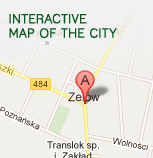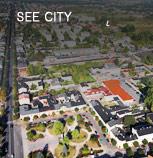The Economy
The economy of the Zelów Commune specialises in producing and servicing. Light industry plays a leading role in the region. Companies of this branch are the biggest transactors. Their production has enlivened the buildings of non-existing state textile plants. The textile firms employ 1000 people, the biggest of them being the "Torun Dressing Materials Plant", "Cosmetic Cotton Products", "Mag-Rys" or "Han-Met". The great advantage of the Zelów commune is its location in the neighborhood of the fuel-energetic complex in Bełchatów which concentrates a big economic potential. In the past few years there has been a significant increase in the number of small firms that created new work places, and diversified employment in the commune. There are 723 transactors among whom there are numerous trade institutions, service institutions and firms dealing with building industry. A potential investor can find benevolence of the local authorities and the Zelów Development Foundation whose mission is to create good conditions for economic and social development in the region of Łódz. The Foundation is registered in the State System of Small and Medium-sized Enterprises as for the operating rage connected with advice service, financial support, educational and informative roles and it is an affiliated centre of the Agro-Info Network. It has a launched system of quality management in accordance with the norm PN-EN ISO 9001:200, certified for its quality (certificate number 81/SZJ/2004, issued on 16.06.2004 by Zetom-Cert Ltd). The support in the field of economic development is implemented by the Advisor- Education Centre, Zelów Enterprise Foundation, Zelów Enterprise Incubator. These institutions deal with consulting, training, loan surety, loans for those who start their economic activity as well as renting office and production space on preferential terms for newly created firms, which creates a friendly atmosphere for further development of the Zelów commune.
The services are implemented within the confines of assistant programmes financed by EU funds (including PHARE funds), the World Bank, The Ministry of Economy and Work as well as other institutions.



























